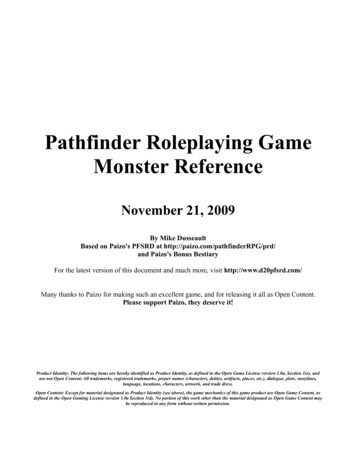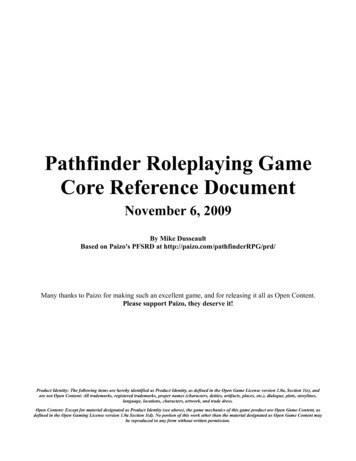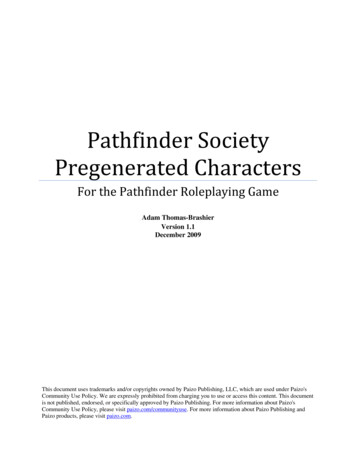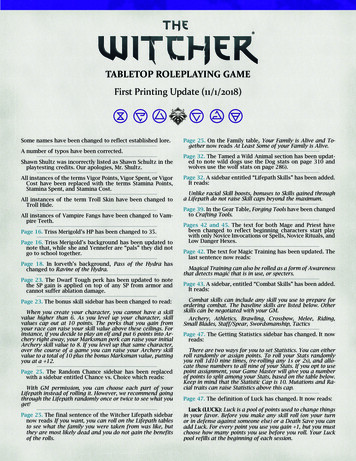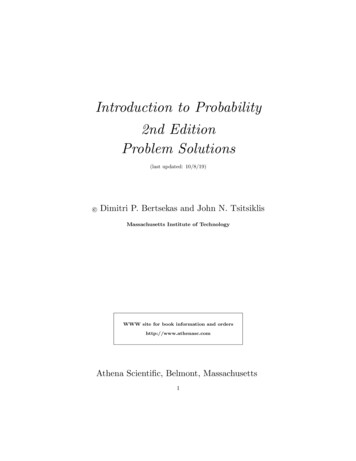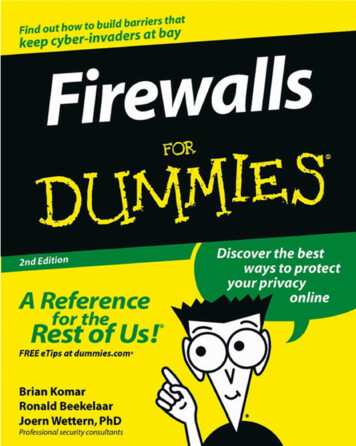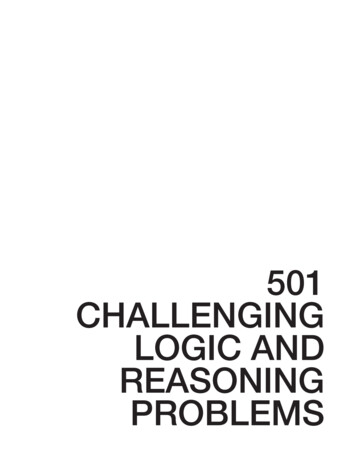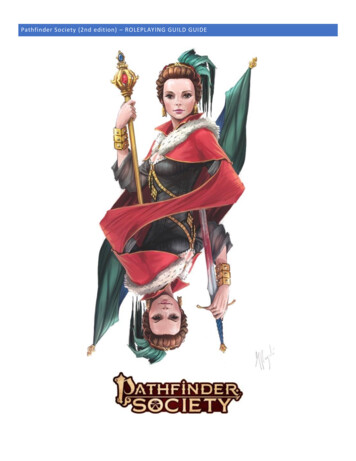
Transcription
Pathfinder Society (2nd edition) – ROLEPLAYING GUILD GUIDE
PATHFINDER SOCIETY (2ND EDITION) QUICK START GUIDEPathfinder Society (2nd edition) Roleplaying Guild Guide Quick Start GuideCurrent Version: 0.02Current Version Date 8/5/2019 – 18:00This short guide is for players who are new toPathfinder Society. It explains the basics ofhow to join the Pathfinder Society and play inPathfinder Society Organized Play games.REGISTER FOR ORGANIZED PLAYTo ensure you have access to all the tools andbenefits available to our players, you need toregister a paizo.com account for organizedplay. If you have not yet created an account,you can do so by navigatingto paizo.com, clicking “Sign In” in the upperrighthand corner of the page, and then clickingthe “Create New Account” button and followingthe instructions on the following pages.Once you’ve created a paizo.com account, login and hover over the “My Account” tab in theupper-right corner of the screen and select“Organized Play” from the dropdown menu (formobile phone users, you may need to tap on“My Account” for the dropdown to appear). Thiswill take you to your personalized PaizoOrganized Play page. From here, you candownload a copy of your Organized Play IDCard, examine or update any of the charactersyou register, and view a log of the sessionsyou’ve played.To register a new character, click “Register aNew Pathfinder Society (2nd edition)Character” near the bottom of the page.If you don’t have a chance to registerbefore your first game, your Game Master(GM) will give you an Organized Play IDnumber you can input when you do register toget credit for that game.LEARN THE COMMUNITY STANDARDSAll participants in Organized Play must adhereto the community standards—read throughthem and uphold them at all Organized Playevents and sessions.CHARACTERSNext, you need a character to play. You caneither use a pre-generated character or createyour own character.USING A PREGENERATED CHARACTERIf you don’t have time to create a newcharacter or want to try out a new characterclass, you can use a pregenerated character,also called a pregen. The Pathfinder SocietyRoleplaying Guild offers free pregeneratedcharacters based on Pathfinder’s iconiccharacters, available at paizo.com or fromyour local event coordinator. You can find moreinformation on pregenerated characters here.CREATING A CHARACTERCharacter creation for the Pathfinder SocietyRoleplaying Guild follows the guidelines inthe Pathfinder Core Rulebook, with a fewadditional Roleplaying Guild-specific rules andbenefits. Character Creation contains step-bystep instructions to help you create your ownRoleplaying Guild character and explainsorganization’s special rules and benefits. Readinstructions rules carefully to ensure yourcharacter is suitable for the organized playcampaign. All Pathfinder Society charactersmust start at 1st level.Character Options: All of the ancestries,backgrounds, and classes from the CoreRulebook are available to you when creating acharacter. You may need tospend Achievement Points to access someancestries and options from other books beforeyou can use them in organized play. Moreinformation on approved resources can be
found in the upcoming Character Optionsdocument.BEFORE THE ADVENTURE SESSIONAt the game table, introduce yourself to theother players and the Game Master. Take thistime to determine which character within theadventure’s tier (range of levels) you want toplay—this can be a character you created or apregenerated character. The GM will also passaround a sign-in sheet to record yourcharacter’s name, level, faction, and OrganizedPlay ID (if you don’t have an Organized Play IDyet, your GM can assign you one). During thistime, you also need to decide whether you areusing Standard Advancement or SlowAdvancement. (Slow advancement lets youplay more scenarios with that same characterbefore you reach the maximum level; standardadvancement helps you level up and becomepowerful more quickly).DURING THE ADVENTUREIn addition to the game rules in the CoreRulebook, Pathfinder Society Organized Playhas several additional rules for gameplay.These are the two most important.ONE CHARACTER PER ADVENTUREYou can have as many active characters asyou want in Pathfinder Society. However, youcan play only one of your characters during aspecific adventure. If a fourth character isneeded to meet the minimum number ofcharacters per table, the fourth character mustbe a pregenerated character. The GM canassign a player to play the pregeneratedcharacter as well as their own character, or theGM can allow the group as a whole to choosethe pregenerated character’s actions.NO CHARACTER-VERSUS-CHARACTER COMBATThe motto of the Pathfinder Society is “Explore,report, cooperate.” In keeping with the“cooperate” theme, do not engage in characterversus-character conflict. Accidental friendlyfire can happen (due to missed attack rolls orother factors), but players must obtain theconsent of other players before deliberatelyincluding fellow PCs in damaging effects. Insuch cases, the damage dealer should offer toassist with necessary healing costs. This ruledoes not apply in situations where a characteris not acting of their own free well, such as ifthey’re being mind-controlled by an NPC andforced to attack a fellow Pathfinder.AFTER THE ADVENTUREUpon completing an adventure, you’ll receive aChronicle sheet from the GM. This sheet is areflection of your accomplishments andincludes a recap of your adventure; a log of theExperience Points, treasure access, andwealth gained; and a special boon reflectingyour experiences in the adventure. If youcreated your own character, this Chroniclesheet applies to that character, and you maywish to record the Experience Points yougained, the wealth you spent and earned, anditems you bought on your character sheet. Ifyou played a pregenerated character, thisChronicle sheet will apply to the first characteryou create.As a player, you are expected to keepaccurate, up-to-date records of your charactersand bring your Chronicle sheets to everyPathfinder Society event or session. If youdon’t bring your Chronicle sheets for acharacter, you will be unable to play thatcharacter, though you can play anothercharacter or a pregenerated character of anappropriate level instead. We suggest keepingeverything in a binder with an individual folderfor each character.See Chronicle Sheets and Recordkeeping forinformation on filling out Chronicle sheetsand Negative Effects for how to resolvenegative effects at the end of an adventure.If you haven’t registered for organized playat paizo.com, remember to do so now!REPLAYING ADVENTURESGenerally you can receive up to two Chroniclesheets for a given adventure, one for playing
an adventure and one for running the sameadventure as a GM. Some adventures havethe “replayable” tag and can be replayedmultiple times. For more information onreplayable scenarios, see ReplayingAdventures.PLAYTEST POINTSIf you already have points or boons accruedduring a playtest, see Special Rewards forinformation on redeeming playtest points andusing playtest boons.
PATHFINDER SOCIETY (2ND EDITION) ORGANIZED PLAY BASICSPathfinder Society (2nd edition) Roleplaying Guild Guide Organized Play BasicsCurrent Version: 0.02Current Version Date 8/5/2019 – 18:00Pathfinder Society, which is part of Paizo’sorganized play program, is a worldwide fantasyroleplaying campaign that puts you in the roleof an agent of the Pathfinder Society, alegendary league of explorers, archaeologists,and adventurers dedicated to discovering andchronicling the greatest mysteries and wondersof an ancient world beset by magic and evil.The campaign is set on the world of Golarion,and its home base is Absalom, the so-calledCity at the Center of the World, which standsastride the great Inner Sea on the mountaincapped Isle of Kortos. A Pathfinder’sadventures range from exploring the darkalleys and political intrigues of Absalom toembarking on far-flung travels to the mostexciting locales in the Lost Omens setting.Pathfinder Society Organized Play usesPathfinder Second Edition. This guide presentsthe information you need to participate in thisexciting, dynamic campaign. Welcome to thePathfinder Society!WHAT IS ORGANIZED PLAY?In an organized play campaign, your characteradventures in a shared setting with thousandsof other gamers worldwide. Games can takeplace anywhere, including homes, gamestores, libraries, conventions, and online.Afterward, participants report their adventures’results, both earning campaign rewards andinfluencing the fate of the Lost Omens setting.As part of the organized play experience, youcan take your characters to any PathfinderSociety event in the world, allowing you to joina game with friends and strangers alike withease. And after each adventure, yourcharacters grow stronger and can carry theirrewards with them to the next adventure, evenif your fellow players and Game Masters (GMs)change between adventures. The organizedplay experience is uniquely immersive, as thediverse range of players, GMs, and charactersprovide incredible depth. The campaign is alsoa great way to meet other gamers and playregularly without needing to schedule regularevents with a single set of people as you mightfor a more traditional game.In order to help the Pathfinder Society programfunction smoothly in a shared-worldenvironment, the campaign has someadditional rules to ensure a fair and equalexperience for all participants—no matter whois playing or running the game. The rest of thisguide covers that information.Paizo’s organized play team oversees thecampaign’s content, and team membersinclude the Organized Play manager, theOrganized Play lead developer, PathfinderSociety developers, and the Pathfinder Societydesign liaison. Volunteers called VentureOfficers facilitate the campaign by coordinatinggames worldwide.Please read over the Quick Start Guide, whichprovides an overview of the campaign andcharacter creation. Review the rest of thisGuide for more details. If you have questions,direct them to the Organized Play managerat organizedplay@paizo.com.SCENARIO TAGSTags are markers that appear both on ascenario’s product page and on its title pagethat gives key information about the scenario’scontents.Exclusive: Scenarios with this tag are meantto be run in a specific environment or by aparticular cadre of Pathfinder GMs. Commonrecipients of these sorts of scenarios includedistinguished volunteers who’ve run manysessions of Pathfinder Society, GMs runningan exclusive scenario at a large convention, ora Paizo staff member. Scenarios with this taginclude specific rules on who is eligible to run
it, where it may be run, and any otherconsiderations for eligibility of receiving credit.Faction: Scenarios with this tag list one ormore associated factions—for example,“Faction (Envoy’s Alliance).” This tag generallycorresponds to scenarios with additionalReputation awards for the associated factions.Glyph: Scenarios with this tag contributetoward one of the ways that GMs can earn 5Glyphs. (See GM Glyphs )Repeatable: Scenarios with this tag can bereplayed an unlimited number of times (butonly once per character). GMs receive anotherChronicle sheet each time they run a scenariowith this tag, but can apply credit only once toa given character.TYPES OF ADVENTURESNumerous types of adventures are used in thePathfinder Society campaign.Pathfinder Society Quests: These are shortadventures written for Pathfinder Society andintended to take about 1 hour to play.Pathfinder Society Scenarios: These are themost common adventure type written forPathfinder Society, and they typically takeabout 4–5 hours to complete.Pathfinder Adventure Paths: These are longcampaigns consisting of multiple adventurevolumes and often representing dozens ofgame sessions to complete. Adventure Pathsare published for a wider audience than thePathfinder Society campaign, so suchadventures often include a short, downloadablesanctioning document that details any specialconsiderations for running the adventure fororganized play, as well as Chronicle sheets forthe individual volumes. Adventure Paths oftenoffer the opportunity to experience them inCampaign Mode, which does not usePathfinder Society rules, allows the GM tofreely modify the encounters and story, and stillawards a Chronicle sheet afterward.Pathfinder Adventures: These are large,stand-alone adventure books that typically takenumerous game sessions to complete. LikeAdventure Paths, Pathfinder Adventures aredesigned for a wider audience and thustypically receive a short sanctioning documentthat can be downloaded from the adventure’sproduct page soon after its publication.TIERS AND SUBTIERSPathfinder Society Scenarios are designed sothat players of a variety of levels canparticipate in a given adventure together. Everyscenario has a tier range and many haveassociated subtiers. For example, a Tier 1–4scenario has subtiers 1–2 and 3–4. Tiersindicate which character levels are legal forthat scenario. If a PC’s level does not fall withinthe tier, that character cannot play in thatscenario.In the future, some special events will havemore than two subtiers. For scenarios withmore than two subtiers, no two PCs at a tablecan be from more that 1 subtier apart. Forexample, in a Tier 1–6 scenario, with Subtiers1–2, 3–4, and 5–6, PCs of levels 1–4 can playtogether, and PCs of levels 3–6 can playtogether, but a level 1 character and a level 6character cannot play together at the sametable, since challenges that are appropriate for5th- and 6th-level PCs are likely to leave the1st-level PC ineffectual at best, if not kill thecharacter outright.LEGAL TABLE SIZEThe minimum table size for a PathfinderSociety session is four players. Therecommended maximum is six players. Incases where you simply cannot seat fourplayers, the GM can run a table of threeplayers, and can play an appropriately leveledpregenerated iconic character (or deputizeplayers to do so) i
Character Creation contains step-by-step instructions to help you create your own Roleplaying Guild character and explains organization’s special rules and benefits. Read instructions rules carefully to ensure your character is suitable for the organized play campaign. All Pathfinder Society characters must start at 1st level. Character Options:
